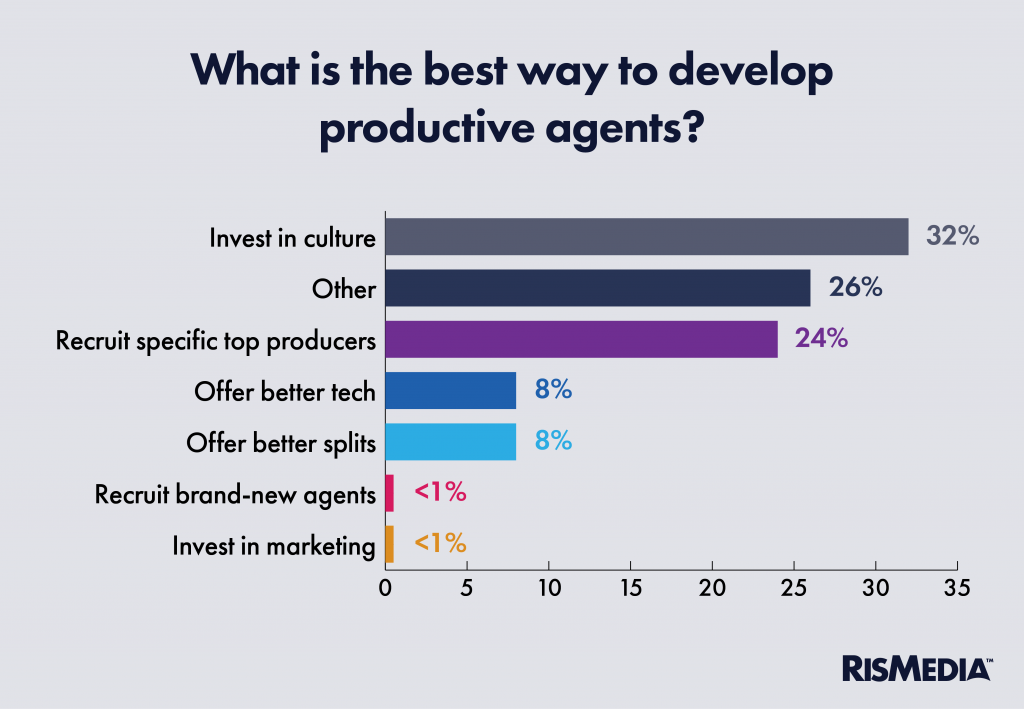Real estate business owners appear to be putting an increased emphasis on agents who are willing to grind, honing in on so-called “business-minded” entrepreneurs while relying on company culture as a recruitment tool in the wake of changes created by the National Association of REALTORS®’ (NAR) settlement.
According to RISMeda’s latest Broker Confidence Index (BCI), a plurality of brokers are choosing to invest in culture to passively attract motivated agents, while qualitatively singling out work ethic as the most important quality in an agent—something that could speak to the types of skills and traits business leaders believe will be most valuable in a new kind of real estate environment.
“I want someone who understands, and has an entrepreneurial mindset,” said Elizabeth Mendenhall, CEO of RE/MAX Boone Realty in Missouri and 2018 NAR president. “Someone who understands that they are growing a business and can sell that asset some day. When someone understands that, they value customer service, knowledge, systems and relationships—and that serves the clients better and benefits the industry and my brokerage.”
Still over a month from when the settlement changes must be implemented, many regions are already seeing shifts in compensation offers and plenty of pressure from consumers based on media coverage. Overall confidence fell slightly this month from 6.8 to 6.6, more likely reflecting how brokers are experiencing high mortgage rates and low inventory, as most regions have yet to see major shifts from the planned settlement changes.
 But the medium-term question of agent skills and knowledge is clearly still a relevant and urgent one for many of those running a real estate business. Brokers previously told RISMedia that they expect the NAR changes to decrease the total number of practicing agents, and even support policies that would filter out unmotivated or less committed real estate professionals.
But the medium-term question of agent skills and knowledge is clearly still a relevant and urgent one for many of those running a real estate business. Brokers previously told RISMedia that they expect the NAR changes to decrease the total number of practicing agents, and even support policies that would filter out unmotivated or less committed real estate professionals.
“I think from now on, we need to assess what (agent) skills will be in getting listings. That will be the only way that we can control the commission we will earn on a transaction,” said Scott Myers, broker/owner of CENTURY 21 Scott Myers REALTORS® in Texas.
What kind of agent, or what kind of skill, philosophy or approach to real estate is best suited to thrive after the changes is an open question. Many within the industry have argued that removing compensation from the MLS and making buyer contracts mandatory don’t fundamentally change the practice, while others have pointed to potential long-term ripple effects from the changes.
Parsing through the more qualitative responses, brokers surveyed last month appear to be leaning toward the first viewpoint—that the same things that have always made agents successful will continue to do so.
“(I value) knowledge of the market and consistency. (Agents who) respond to clients in a timely manner. Communication and follow up,” said Hadi Atri, president and CEO of RE/MAX Executive in North Carolina.
It was not clear whether brokers were significantly shifting their recruiting philosophies, however, in order to find these agents. There was a relatively even split between brokers who said they targeted specific top agents in their region, and those who focused on passive attraction through culture.
 Overall, real estate business owners seemed more inclined to have agents come to them, and were particularly averse to recruiting brand-new agents or explicitly marketing their company for recruiting reasons.
Overall, real estate business owners seemed more inclined to have agents come to them, and were particularly averse to recruiting brand-new agents or explicitly marketing their company for recruiting reasons.
With almost a third (32%) saying they would invest in culture to attract motivated agents compared to less than a quarter (24%) who go after specific targets, the idea that brokers are planning to be more aggressive in competing over skilled agents could be overblown.
Atri specifically rejected the idea that agents would be enticed to join a new company by a higher commission take or some new software, saying that leadership is the best way to bring in motivated agents.
“Good agents don’t leave their existing companies because of better splits or technology. It’s all about leadership and culture. Successful agents look for leadership that looks out for them and coaches and mentors them continuously,” he said.
A market in flux
Aside from the issue of agent skills and recruiting, brokers pointed to some more fundamental issues with the market as weighing on their overall confidence, with an increasing number saying that legal troubles were now a primary factor in depressing near-term optimism.
Just under a quarter (24%) said that the Department of Justice or other legal troubles made them less positive about the market this year, and 8% mentioned that agents were leaving the industry or retiring
But for the most part, a lack of inventory remains the biggest barrier, according to brokers, with 41% citing that as a major cause of stress right now. A handful of brokers cited improvement in that regard, which affirms national data that has shown slight improvements to housing supply.
Overall, brokers seemed to worry that the market is facing problems with no quick solutions.
“The lock-in effect is going to continue to stall movement for a while,” said Donny Samson, principal broker of Samson Properties in Virginia. “Most of the public doesn’t want to move up if it means leaving their 2.5% rate for a 7%. Most people like their house, but they LOVE their mortgage. If less people sell, we will continue to see prices increase. It’s a supply and demand world.”











